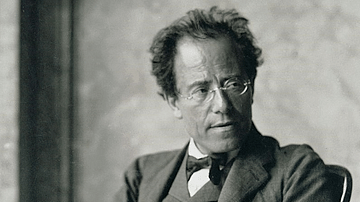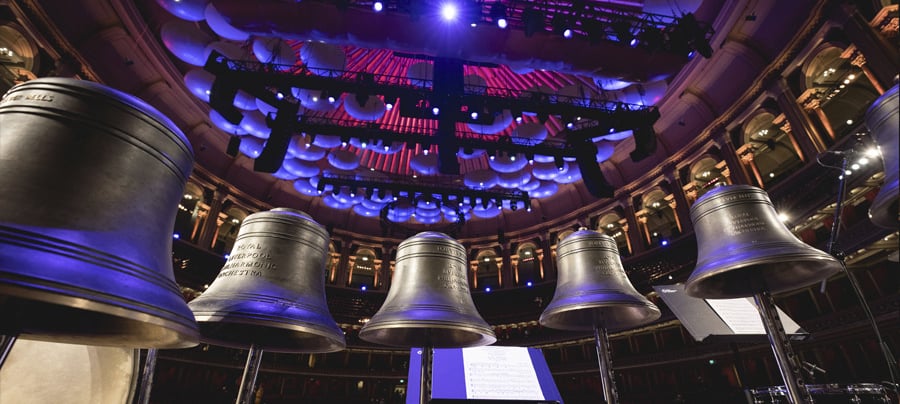Mahler at the Proms
This year the BBC Proms has an excellent selection of Mahler symphonies


A superb opportunity to experience this man's music. The whole of life is here.
Each concert is broadcast live on Radio 3. Typically a shorter piece is played first, and the symphony follows the interval. Click on each date for full details.
Mahler's symphonies are monumental, yet beautifully serene. Mahler was an intensely emotional person and poured all that he felt into his music.
Seventh Symphony
Monday 21st July (77 mins)
Night-time darkness and blazing musical sunlight collide. A musical epic that packs the whole world into five contrasting movements. Vast orchestral forces – including mandolin, cowbells and guitar – conjure a shifting landscape of waltzes, serenades, fanfares, marches and mysterious ‘night-wandering’ – by turns romantic and humorous, sardonic and sincere.
Concert starts 7:30pm.
Second (Resurrection) Symphony
Saturday 2nd August (80 mins)
‘One is battered to the ground and then raised on angel’s wings to the highest heights.’
This symphony offers a panoramic vision of human existence and hope for the life beyond – suffering, redemption and renewal generated by huge orchestral and choral forces.
One listener of the Classic FM Hall of Fame chart, expressed surprised this was the first time he had heard this sublimely beautiful music.
O glaube, du warst nicht umsonst geboren! Hast nicht umsonst gelebt, gelitten!
Concert starts 8pm. Halle Orchestra.


Third Symphony
Monday 11th August (96 mins)
If you thought the second was epic, just wait! The next is even bigger and more profound. An intricate, joyful tapestry of man, nature, heaven. The work opens in heavy summer heat and closes in rapt tranquillity in a sublime finale, animated in between by marches, dances and birdsong.
This incredible work is outrageous and breathtakingly ambitious. A piece of such magnitude that it encompasses the whole world. The whole of nature and human endeavour finds a voice. It starts with Pan Awakes, where Pan is both the Greek god and the Greek word meaning "all".
There is a deliberate contrast between the love of power (4th movement) with the power of love (final movement). The fourth movement, Nietzche’s Midnight Song, is humanity’s struggle to make sense of the world, its joy and its grief. Very sombre, almost depressing music.
At the end of the fifth movement, the orchestra waits 5 minutes before playing the sixth and final movement. Five minutes of silence to ponder all that has gone before.
The last movement is called “What love tells me”, specifically what God’s love tells me. There are no words. What language can utter heavenly love more powerfully and forcefully than pure music. It is the most sublime music. The contrast with the bleak Nietzche poem could not be more profound. This is the calm after the storm. Heartfelt and exalted feelings. It begins very softly and slowly builds to a loud and majestic conclusion. Love wins!
When I heard this live at the Proms, I walked back to South Kensington tube station in a daze. The journey had been that profound.
Concert starts 7pm.
Fifth Symphony
Saturday 23rd August (68 mins)
This is a tumultuous journey from the darkness of a funeral march to brilliant light.
The variety and number of instruments allow Mahler to craft a marvelously varied tapestry of sound. Bold and dramatic. Grand and turbulent. Buoyant and bright with dance-like themes. Until finally the young hero triumphs and we have the sunny motion of a walk in the countryside on a pleasant morning.
The famous Adagietto is a break from the action. Brass, woodwinds and percussion are all set aside, with only strings and harp used to evoke a sweetly reflective mood, the tenderest musical love letter in the repertoire.
The orchestra with the finest Mahlerian pedigree, the Royal Concertgebouw Orchestra of Amsterdam, pays a visit with its Chief Conductor-Designate, Klaus Mäkelä – not yet 30, and arguably the hottest property in classical music.
Concert starts at 8pm.



